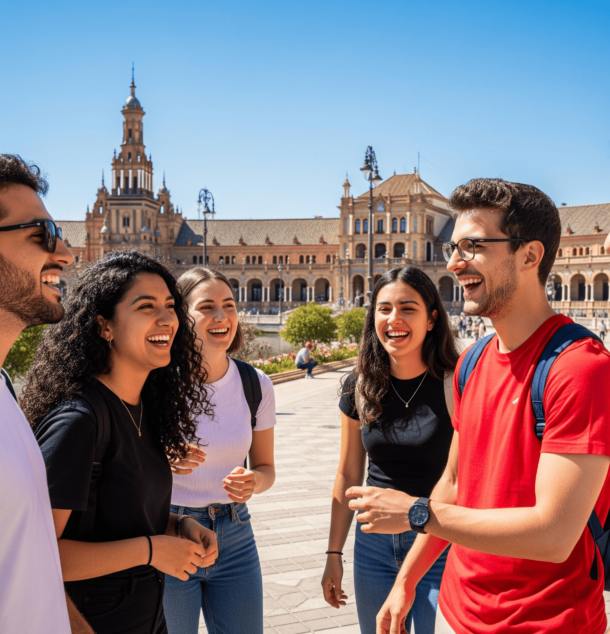Spain and Latin America: Navigating Cultural Differences During Your Internship
If you’re interning in Spain and have a Latin American background, it’s natural to believe that cultural differences won’t really be an issue. There is Spanish on both sides, extensive shared historical connections, and not unusual to see similar traditions being observed. But as many interns quickly discover, Spain and Latin America are remarkably different when you get down to day-to-day, social norms, and office culture.
As an foreign intern, it is also essential to pay attention to them because it can enrich your experience, keep you away from getting into misunderstandings, and make you appreciate the cultural variety of the Spanish world even more.
1. Accent
Although the national language in Spain and the majority of Latin America is Spanish, the way people speak it is rather different.
On the contrary, in Spain you will perceive the typical “Castilian lisp” where the letters “z” and soft “c” are pronounced as the English “th.” But in Latin America the sound doesn’t exist. In fact, words are pronounced more phonetically, especially in such countries as Mexico, Argentina, or Colombia.

2. Similarities and Unexpected Differences
As with British and American, so also Spanish spoken throughout the world varies. To the contrary, words differ from place to place. Coche (Spain) is auto (Latin America), “car,” for instance. In Spain, a computer is used most frequently as ordenador, while in Latin America you can use “computadora”. The same goes for telephones, “móvil” in Spain, “celular” in Latin America.
Even simple words like “here” do vary, though: “aquí” is found in Spain, but “acá” is employed by most of Latin America. With love, you can say both querer and amar, but you don’t always employ them regionally equally. Food vocabulary is even richer, a strawberry may be a fresa or a frutilla, a banana may be a plátano or a banana, and an avocado can be called aguacate, palta, or avocado.
3. Formality and Social Interactions
On the other, Spaniards are more straightforward and informal than most of Latin America, both at work and in society. It’s common to say hello to business coworkers with a casual “¡Hola, tío!” (essentially greeting someone as “Hey, man!”) and calling people by first names, even the boss. Social and business Spanish culture tends to be flatter and less formal, where hierarchy is not emphasized so much.
On the other hand, such informality is relative and varies with area. Large cities like Madrid and Barcelona have people who are more liberal and casual. Small towns or more traditional areas may exhibit slightly higher formality, more similar to the courteous and respectful tone that is pretty prevalent in Latin America. Hierarchy respect is very deeply ingrained in most Latin American countries. Respectful greetings, titles, and polite language are often called for, especially within an employment context.
4. Time and Punctuality
There is one of the biggest cultural changes for Latin American interns in Spain in relation to time being perceived. The rhythm of life in Spain is different, lunchtime at 2 or 3 o’clock, dinnertime at 9 or 10 o’clock, and late evening social activities tend to start very late at night.
Even with this casual daily schedule, punctuality is to be ensured in the workplace. Being punctual is most important, especially in the business world.
This may be a departure from most Latin American countries, where the famous “hora latina” confirms a more relaxed philosophy about time and punctuality. While the adjustment may be startling at first, most interns adapt comfortably and find themselves embracing Spain’s combination of formalized work ethic and casual social life.
5. Culture at Work
Spain working involves adjusting to the work culture of balance. Although the old stereotype of siesta hour has been obsolete in city centers, long breaks for lunch and generous holiday periods remain the standard.
LatAm workplaces tend to be more hours-intensive and hierarchical. Spain can seem laid-back, but don’t mistake that for unprofessionalism. Expect interns to query things, take initiative and operate as part of the team. Being open and inquiring is the way to become “one of the team.”
6. Cultural and Historical Context
Spain and Latin America share a colonial past, but the modern identities are quite different. Spain is an EU-facing European nation, while Latin America has been shaped through interactions of Indigenous, African, and European cultures. This has resulted in a prosperous cultural richness in Latin American countries.
As an intern in Spain, you will find it useful to appreciate the differences to better navigate cultural conversations and not make assumptions. Latin Americans will culturally identify very much with Spain, but Spaniards may not necessarily perceive the relationship in the same way.
7. Celebrations and Traditions
Both Latin America and Spain rejoice in color, but the meaning and style are often different. Spain’s cultural festivals such as Semana Santa (Holy Week), San Fermín, and La Tomatina are more religious or history-based. Latin America has colorful and symbolic festivities as well, such as Mexico’s Día de los Muertos and Carnaval in Brazil and Colombia.
Participating in local festivals while interning is a great opportunity to become immersed in the culture, become friends with others, and enjoy the festivities and pride individuals have for their traditions.

Conclusion
If you are a Latin American interning in Spain or a Spaniard who wants to work in Latin America, the differences in language, culture, and daily life are real, but they are also what make the experience so engaging. Instead of expecting sameness, dive into the diversity of the Spanish-speaking world.
Working abroad is not about gaining work experience—it’s about opening your eyes. And in that sense, noticing and appreciating the differences between Spain and Latin America is perhaps the most valuable part of the experience.
The habits you build and the people you meet during your internship can have a lasting impact. So jump in with an open mind, a positive attitude, and a real eagerness to learn. If you ever get a chance to intern or work in Spain, especially for Animafest Experience, do not think twice. You might be amazed not only by what you realize professionally but by what you discover about yourself.
Remember to share your pre-departure preparations with us as you get ready for your trip. On social media, use #AnimafestIntern2025 and tag @AnimafestExperienceInternships on Instagram. The adventure has just begun, and we can’t wait to see how your trip unfolds.
Start your Animafest experience by clicking the button below. This is your chance to embark on a life-changing journey, acquire useful skills, and experience lifelong experiences in one of Europe’s most breath-taking nations.








